Fenugreek is a herbal extract derived from plant seeds that is used to boost testosterone, increase libido, and assist with weight loss and some of its related benefits, like lower blood sugar and lower cholesterol levels.
Fenugreek is often found alongside other androgen stimulating compounds in testosterone boosting supplements, and its interaction with male sex hormones makes it attractive as an ingredient in supplements for male sexual health and performance.
Don’t think that fenugreek is just for men, though—many women use it to boost breast milk production when they are breastfeeding.
Looking to capitalize on all of the health and wellness benefits of fenugreek? Our research team has rated and ranked the ten best sources of fenugreek on the market.
Research
Rankings
1. Nutrigold Fenugreek Gold
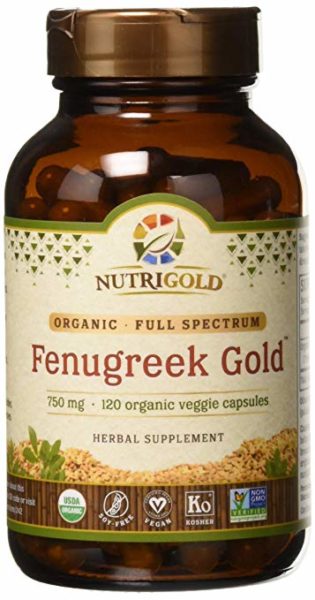
Nutrigold Fenugreek Gold is our top pick for fenugreek because of its organic certification, high dosage, and clean supplement design.
Each vegan-friendly capsule has 750 mg of raw fenugreek seed, which is certified organic. The capsules themselves are made from pullulan, a plant-derived compound, and aside from that, there are zero additional ingredients in this supplement.
No matter what you’re looking for, it’s impossible to go wrong with this fenugreek supplement.
2. Vitamonk FenuTrax
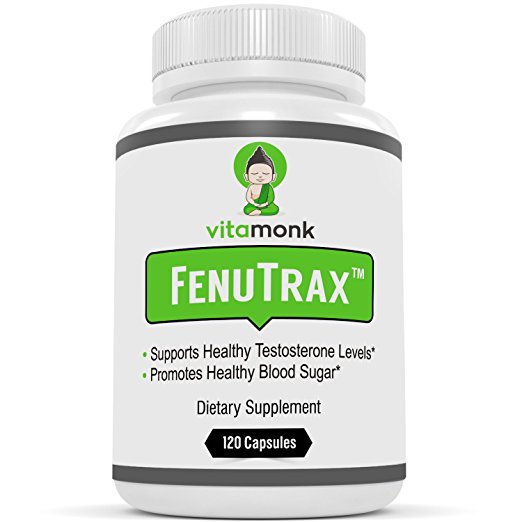
Vitamonk FenuTrax takes a more scientific approach than many of its competitors. Instead of simply delivering raw fenugreek seed in its capsules, it packages 500 mg of a standardized fenugreek extract that contains 60% saponins, the type of molecule though to be responsible for the health benefits of fenugreek.
If you want to emulate the clinical research to the best extent possible, this is the fenugreek supplement you should choose.
3. Anthony’s Fenugreek Seeds
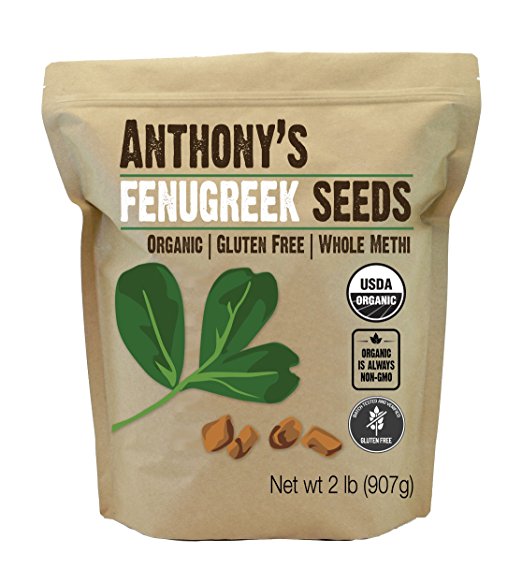
If you want to go as raw as possible, Anthony’s Fenugreek Seeds are raw, bulk, and unprocessed. The hull of raw, whole fenugreek seeds can be pretty hard, so you will have to grind or crush it in some fashion to make it edible.
Moreover, you’re not likely to absorb much of the active ingredients if you ingest whole fenugreek seeds without grinding or crushing.
The added inconvenience that comes along with processing the seeds, and the difficulty of measuring out a precise dosage if you don’t have an accurate scale means bulk seeds aren’t for everybody, but if you use a lot of fenugreek and want to mix it into shakes or smoothies, there’s no better product on the market for you.
4. Nutricost Fenugreek
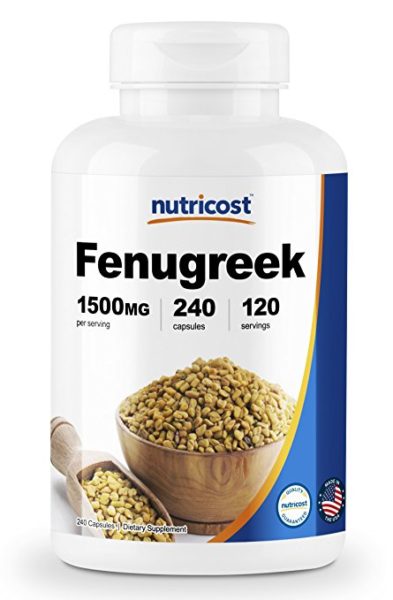
Nutricost has a fenugreek seed supplement with 750 mg of raw seed material per capsule.
The capsules are gelatin-based, which won’t please strict vegetarians and vegans, but those in search of purity will love Nutricost Fenugreek, as the only two ingredients are fenugreek seed and gelatin.
5. Nature’s Way Fenugreek
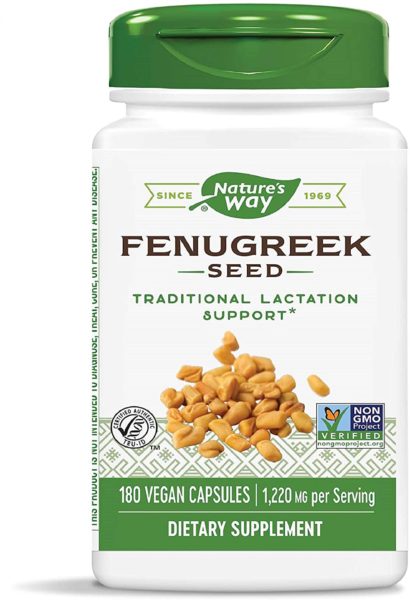
Nature’s Way Fenugreek is a simple fenugreek seed supplement that delivers 610 mg of raw fenugreek seed per vegetarian, cellulose-based capsule.
The dosage is solid and the ingredients are straightforward, save for the inclusion of silica as an anti-caking agent—some purists won’t like this, but just about everyone else can be happy with this fenugreek supplement.
6. Best Naturals Fenugreek
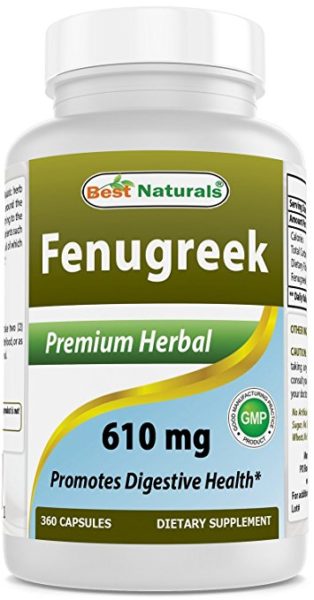
Best Naturals Fenugreek has 610 mg of fenugreek per capsule, and its capsules are derived from animal-based gelatin.
The dosage is middle of the road, but the quality is good: aside from gelatin, fenugreek seed is the only ingredient in this supplement.
7. NOW Fenugreek
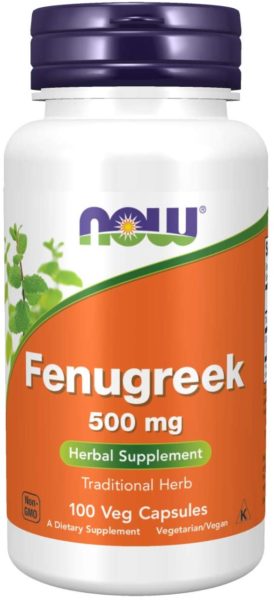
NOW Fenugreek has 500 mg of raw fenugreek seed per capsule, and though this supplement is fairly popular, it doesn’t quite have the edge that some of its competitors have when it comes to purity and clean supplement design.
There are a few too many binders and stabilizers, like silica, that make it difficult to rank PureNaturals Herbs Fenugreek any higher, even though the dosage is pretty solid.
8. Mama’s Select Fenugreek High Potency
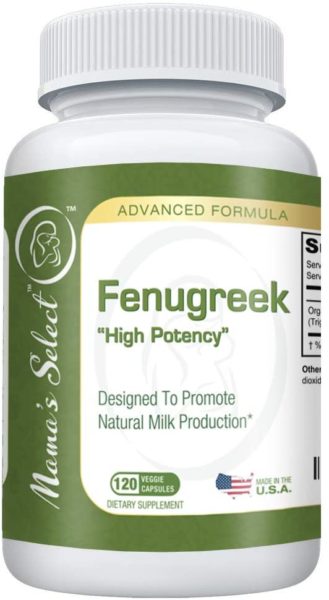
Mama’s Select Fenugreek High Potency is a fenugreek supplement designed specifically for increasing breast milk production, and though this product is billed as “high potency,” the dosage is pretty average, at 610 mg per capsule.
While it’s an okay overall fenugreek supplement, the supplement design isn’t the cleanest, and there are other fenugreek products out there that provide a similar or higher dosage with fewer binders and stabilizers in the capsule.
9. Fenugreek +
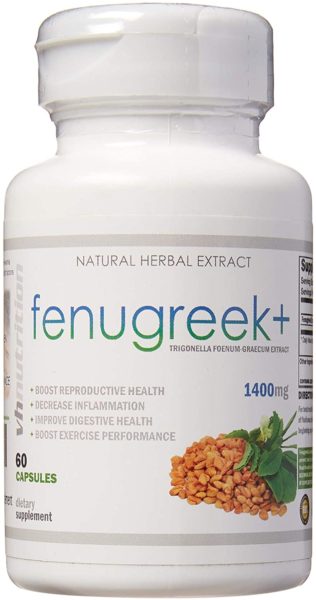
Fenugreek+ has a middle of the road dosage when it comes to raw fenugreek seed supplements, but it finds itself lower in the rankings because it doesn’t have the same independent purity testing as some of its competitors.
The capsules themselves are not vegan-friendly, which is another issue, albeit not for everyone.
10. Pink Stork Total Lactation
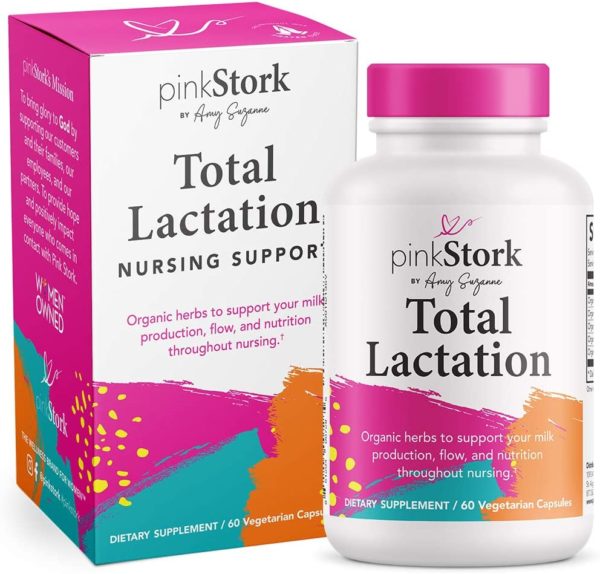
Pink Stork Total Lactation fits a very narrow niche: women who want to take advantage of fenugreek’s purported benefits for breastfeeding, as well as take a supplement with other nursing support supplements. It does this job well, but the narrowness of this supplement hurts its overall position in our rankings.
Category winners
Best fenugreek overall: Nutrigold Fenugreek Gold
Pure, organic, and packing a high dosage, Nutrigold Fenugreek Gold is quite simply a flawless fenugreek supplement. Even the capsules are made from quick-dissolving plant-sourced pullulan, meaning nothing stands in the way of your body rapidly absorbing the biologically active compounds in fenugreek.
Best fenugreek for women: Nature’s Way Fenugreek
Fenugreek is not just for men—for women, we recommend Nature’s Way Fenugreek, thanks to its modest dosage and pure formulation. For metabolic control and breast health, Nature’s Way is a good pick.
Best bulk fenugreek: Anthony’s Fenugreek Seeds
Most people want to use fenugreek in capsule form, but if you’re looking to grind it up for a custom shake or smoothie, the all-natural and organically certified seeds in Anthony’s Fenugreek Seeds are the way to go.
Best fenugreek for men: Vitamonk Fenutrax
If you’re looking to take advantage of fenugreek’s testosterone-boosting capabilities, Vitamonk Fenutrax should be your choice. Its concentrated fenugreek extract makes the most of fenugreek’s androgen-boosting effects.
Best fenugreek for weight loss: Nutrigold Fenugreek Gold
Fenugreek boosts androgens, which in turn burn fat—if that’s the effect you are looking for, we recommend Nutrigold Fenugreek Gold thanks to its super-pure formulation. Keeping additional ingredients to a minimum is key if you are taking other supplements alongside fenugreek for weight loss.
Best fenugreek for more libido: Vitamonk Fenutrax
Want a natural way for better bedroom performance? Vitamonk Fenutrax is our recommendation. Its ability to boost testosterone and other male sex hormones means you’ll find yourself with more energy and stronger erections in bed, without turning to bloated male enhancement pills.
Who should buy fenugreek?
Fenugreek is safe for most individuals and is great for people looking to improve gym performance, muscle building and testosterone levels naturally. Fenugreek is also great for people looking to improve libido.
Pregnant women should not consume fenugreek since it can mimic the effect of certain hormones the may affect the pregnancy.
How we ranked
When ranking the best fenugreek supplements, we first looked at the dosage. Proper doses will depend on the benefit you are seeking, but most studies show nothing less than 500mg should be used. As such, we preferred products like Nature’s Way and Pure Natural’s, which included at least that amount, with the latter including more.
We also decided to only include pure fenugreek products, which is why you’ll find no “testosterone blends” on our list. The reason being is that most “blends” will include very little fenugreek and much more filler herbs that don’t work as well.
Regarding delivery, there are three main methods: seeds, powders, and capsules. We decided not to include seeds because they tend to be difficult to digest and can cause IBS like issues. Capsules, like Vitamonk and NutriGold, were preferred over powders due to convenience and dosage accuracy. Furthermore, the powder can be bitter, making compliance more difficult.
Benefits
Fenugreek is a plant-based supplement taken primarily for its libido-boosting ability and for the treatment of diabetes. Thanks to its androgen-boosting properties, it is also found in many testosterone boosters.
Like so many herbs, fenugreek — a popular Ayurvedic medicinal plant — has been used for centuries to help treat and prevent a great many conditions. The seeds and extracts have historically been used as an antispasmodic, blood cleanser, expectorant and to treat high cholesterol and wounds.
The active compounds present in fenugreek include soluble fiber, saponins, trigonelle, diosgenin and 4-hydroxyisoleucine (1). Researchers have been focusing on these compounds to better understand the mechanisms of this plant.
Other constituents include mucilaginous fiber, proteins high in tryptophan and lysine, pyridine-type alkaloids, such as trigonelline, flavonoids, free amino acids, vitamins, minerals and volatile oils (2).
Fenugreek boosts libido. In 2011, researchers of a clinical study evaluated the effect of Testofen, a standardized fenugreek extract and mineral formulation, on male libido (sexual drive, urge or desire). The study consisted of 60 males (aged between 25 and 52) without erectile dysfunction randomized to receive either 600 mg Testofen per day or placebo for six weeks.
Testofen had an overall positive effect on physiological aspects of libido. In particular, there was a significant reported increase of sexual arousal and orgasm. Men who took the fenugreek had increases in their libido scores of more than 25 percent. The men who took the placebo saw either no increase or a decrease.
Testofen also had a positive effect in self-reported satisfaction with muscle strength, energy and well-being.
Other takeaways: it did not have an effect on mood or sleep and serum prolactin and helped to maintain normal, healthy testosterone levels (3).
Fenugreek has also been shown to increase sexual arousal and desire in women (4). A 2015 study evaluated the effect of fenugreek seed extract on sex hormones and sexual function in healthy menstruating women who reported low sexual drive.
The short-term placebo-controlled study was conducted on 80 women, aged 20 to 49 years. Two groups received either a dose of 600 mg per day or placebo over two menstrual cycles.
There was a significant increase in free testosterone and estradiol in the fenugreek-treated group as well as sexual desire and arousal compared with the placebo group.
Individual aspects of sexual function were measured using the Derogatis interview for sexual functioning and female sexual function index self‐administered questionnaires. Stress, fatigue and quality of the relationship with partner were also measured using the Perceived Stress Scale, Multidimensional Fatigue Inventory and Dyadic Adjustment Scale quality of life measures (5).
Fenugreek has a hypoglycemic effect. The hypoglycemic effect of fenugreek seeds and leaves was tested in normal and diabetic subjects in a study published in Nutrition Research. Six protocols were given to the participants: whole fenugreek seeds, defatted fenugreek seeds, gum isolate, degummed fenugreek seeds, cooked fenugreek seeds and cooked fenugreek leaves.
At the conclusion of the study, the researchers reported the following observations:
The rise in plasma glucose was prevented by fenugreek seeds and the serum insulin levels were also modified.
The greatest reduction in glucose was seen in whole seeds (42.4 percent), followed by gum isolate (37.5 percent), extracted seeds (36.9 percent) and cooked seeds (35.1 percent).
The 24 hour urinary glucose output and serum cholesterol levels were also reduced.
The degummed seeds and fenugreek leaves showed little effect on glycemia (6).
In another study, researchers set out to evaluate the effects of fenugreek seed on glycemic control and insulin resistance in mild to moderate type 2 diabetes. Twenty-five patients received either 1 gm/day hydroalcoholic extract of fenugreek seeds or placebo capsules for two months along with dieting and exercise.
At the end of the two months, results revealed that fenugreek seeds improved glycemic control and decreased insulin resistance.
In addition, serum triglycerides decreased and HDL cholesterol (a.k.a. “good cholesterol”) increased significantly in the fenugreek group compared to the placebo group (7).
Researchers believe that the antihyperglycemic effects may be linked to delayed gastric emptying caused by the fiber content in fenugreek, and to components that inhibit carbohydrate digestive enzymes (8).
The results of yet another study showed that fenugreek had a similar hypoglycemic effect. Twenty obese male volunteers aged 20-30 years were randomly treated with either 40 mg/kg fenugreek aqueous extract powder in 10 mL distilled water or 10 mL distilled water in which coffee simulated the extract.
The aqueous extract significantly lowered blood glucose level by 13.4 percent four hours after ingestion. A significant change of 14.1 percent was observed in potassium levels (9).
Fenugreek has an LDL cholesterol-lowering effect. According to the results of a study published in Plant Foods for Human Nutrition, consumption of germinated fenugreek seed powder resulted in a hypocholesterolemic effect.
Men and women in the age range of 50–65 years were divided into two groups and were asked to add one packet per day containing 12.5 g and 18.0 g of the germinated powder to any dish of their choice for one month.
While both dosages resulted in a hypocholesterolemic effect, the higher dosage resulted in a significant reduction in total cholesterol and LDL (“bad cholesterol” levels). No significant changes were found in HDL (“good cholesterol), VLDL (very low-density lipoprotein) and triglyceride levels in all the subjects (10).
Fenugreek has an anti-inflammatory effect. A 2016 study put petroleum ether extract of fenugreek seeds to the test to evaluate its efficacy in a clinical study to treat inflammation.
The fenugreek seed petroleum ether extract was tested on rats against carrageenan and formaldehyde-induced paw edema.
With 0.5 mL/kg fenugreek extract treatment there was a 37 percent and 85 percent reduction in inflammation of the paw in carrageenan and formaldehyde-induced paw edema. Researchers attribute this anti-inflammation effect to the presence of linolenic and linoleic acids (11).
Fenugreek acts as an appetite suppressant. Fenugreek seeds have been shown to modulate feeding behavior in animals, but due to a lack of strong clinical evidence in humans, researchers are increasingly evaluating its effects in more studies.
According to the European Journal of Clinical Pharmacology, 12 healthy male volunteers completed a double-blind randomized placebo-controlled three-period cross-over trial of two different doses — 588 and 1176 mg — of a fenugreek seed extract.
The results of the 2009 study revealed that daily fat consumption was significantly decreased by the repeated administration of the higher dose of fenugreek seed extract (12).
Fenugreek stimulates breast milk production. Insufficient milk production is typically the main reason why mothers stop breastfeeding. Nonpharmacological interventions remain the most popular remedies for trying to promote an increase in milk supply. Fenugreek is among several herbs touted in folkloric tradition for its ability to increase milk production in breastfeeding women, and recent clinical studies have backed up these claims with strong evidence.
While the mechanism of action is not specifically known, researchers believe it may be related to phytoesteogens or diosgenin.
In one study, researchers evaluated whether consumption of herbal tea containing fenugreek had any effects on breast milk production and infants’ weight gain.
Sixty-six mother and baby pairs were randomly assigned to one of three groups: Group 1 received herbal tea containing fenugreek every day; Group 2 was assigned as the placebo; and group 3 was assigned as the control.
Birth weight, loss of birth weight, time of regain of birth weight and amount of breast milk were evaluated.
The results were as follows: maximum weight loss was significantly lower in infants in group 1 compared to both the placebo and control groups; Infants in group 1 regained their birth weight earlier than those in control and placebo groups; The mean measured breast milk volume of the mothers who drank the fenugreek tea was significantly higher than the placebo and control groups (13).
Fenugreek has strong wound-healing properties. Researchers have found that due to its antioxidant activity, fenugreek has strong wound-healing effects. The results of a study published in 2017 showed that the application of a hydrogel of polysaccharide extracted from fenugreek on the wounds of rats significantly enhanced healing activity and accelerated the wound closure after 14 days (14).
In another study involving wound healing in rats, fenugreek once again showed its benefits. Twenty rats with wounds were separated into two groups: Group 1 (control group) was treated with Vaseline while group 2 was treated with a topical application of 10 percent fenugreek ointment twice a day for 21 days.
The results revealed that fenugreek promoted wound healing by early formation of cellular fibrous connective tissue, granulation tissue and early maturation of fibrous connective tissues compared with the control group (15).
Fenugreek may have neuroprotective ability. A 2013 study evaluated a standardized hydroalcoholic extract of fenugreek in animal models of Parkinson’s disease. According to the Parkinson’s Foundation, “Parkinson’s disease is a neurodegenerative disorder that affects predominately dopamine-producing (“dopaminergic”) neurons in a specific area of the brain called substantia nigra.” (16)
The primary characteristics of Parkinson’s disease are abnormalities of movement, including movement slowness, difficulties with gait and balance and tremor (17).
The extract of fenugreek showed a significant increase in the number of ipsilateral rotations (45.67 rotations in 30-min period) as compared with vehicle control group where no rotations were noted.
In addition, the extract at 30 mg/kg showed significant reversal of motor dysfunction (spontaneous motor activity scores, speed, distance traveled and number of square crossed) in pretreatment but not in post-treatment (18).
Fenugreek has pain-relieving properties. The results of a 2014 study published in Reproduction, Fertility and Development reported on the effects of fenugreek seeds on the severity of primary dysmenorrhea (painful periods) among young women.
Two groups were given either 2–3 capsules containing fenugreek seed powder (900 mg) three times a day for two consecutive menstrual cycles or placebo.
While pain severity was significantly reduced in both groups after the intervention, the fenugreek group experienced significantly larger pain reduction. When it came to duration of pain, the fenugreek group reported a decrease between the two cycles.
What’s more, other symptoms — fatigue, headache, nausea, vomiting and lack of energy — decreased in the fenugreek group, and there were no reports of side effects (19).
The analgesic effects of fenugreek have also been tested in animal studies. In one such study, researchers used the tail flick method and divided rats into three groups: control group (saline solution); standard group (Diclofenac sodium); and fenugreek methanolic extract (1000mg/kg body weight).
Drug was administered one hour prior to pain induction. The cut off time was fixed to 23 seconds to prevent damage to the tails.
Results show that high doses of fenugreek methanolic extract increased the pain threshold significantly during the period of observation.
It is suggested that the mechanism of action of the extract might be associated with the inhibition of prostaglandin synthesis, much like nonsteroidal anti-inflammatory drugs (NSAIDS).
Side effects
Adverse reactions of fenugreek may include diarrhea and a maple-like smell to urine, breast milk and perspiration.
Fenugreek should not be taken by pregnant women. It has historically been used in some cultures as a compound for inducing abortions. It is believed to induce contractions of the uterine wall.
Fenugreek may act like estrogen in the body and is thought to be unsafe for women with hormone-sensitive cancers.
Fenugreek could worsen the symptoms of asthma; therefore, individuals with chronic asthma and allergy should avoid consumption of this supplement.
It should not be taken by those taking warfarin or aspirin (20).
Fenugreek may cause an allergic reaction in those who are also allergic to other plants in the Fabaceae family, including soybeans, peanuts and green peas (21).
Recommended dosage
Fenugreek doses depend on the goal of supplementation. As with all supplementation, it is best to consult with your physician before use.
The recommended dosage for breastfeeding mothers looking to increase breast milk production is generally 500-1000mg.
An oral dose of 2-5g of fenugreek seeds can help blood glucose levels for diabetics.
FAQ
What are the benefits of fenugreek? Fenugreek is commonly used as a health supplement and has many scientifically-proven qualities, including antifungal, antibacterial, antiobesity, and anti-cancer (22).
Does fenugreek reduce the risk of diseases? Fenugreek is also associated with decreasing the risk of developing chronic illnesses and diseases such as cancer, diabetes, high cholesterol, high blood pressure, and infections.
Does fenugreek improve strength and muscle? One particular study sought to determine if there was a connection between fenugreek and resistance training in men. After a 4-day per week, an 8-week resistance training program, the study concluded that fenugreek supplementation improved anabolic and androgenic activity in the body. Throughout the process, the group supplemented with fenugreek also experienced a larger boost in testosterone and reduction in body fat, but there wasn’t much of a difference in muscular strength (23).
Another study determined that fenugreek can improve upper and lower body strength in males while also decreasing the amount of body fat. Both of these exercise-related studies prove that fenugreek can be used as an exercise supplement to improve the body (24).
Is fenugreek safe? When consumed in the recommended amounts, there are very few concerns when it comes to consuming fenugreek. However, in large doses, fenugreek can cause issues. Fenugreek may be unsafe for children and pregnant women, though this has yet to be confirmed scientifically.
Is fenugreek safe for pregnant women? Fenugreek exerts similar effects to the hormones testosterone and estrogen, which may alter uterine contractions later on in the pregnancy. As such, fenugreek may not be safe for pregnant women and women looking to conceive.
Does fenugreek increase testosterone? Fenugreek has been scientifically proven to increase testosterone levels in men. In studies evaluating the role of fenugreek in resistance training athletes (men), the fenugreek-supplemented group had a greater increase in testosterone over the course of eight weeks. However, the increase in testosterone has not consistently resulted in an increase in muscular strength. When consumed consistently and within the recommended dosage, fenugreek has the ability to improve testosterone levels in men and boost libido in these consumers. Because of fenugreek’s ability to improve testosterone, there is also a chance that women consuming fenugreek also experience an increase in libido. Fenugreek should not be used intentionally to increase your testosterone, as this may have significant effects on your personal health.
Do side effects increase based on the dosage of fenugreek you consume? Yes, the potential for side effects when using fenugreek increases with the amount consumed. Unless you’re allergic to fenugreek, most of your side effects will be related to gastrointestinal issues (diarrhea and nausea), headaches, or a change in body odors. Since fenugreek acts like estrogen or testosterone in the body, there is a greater potential for side effects in pregnant women.
Does fenugreek really work? Fenugreek has a pretty solid track record when it comes to assisting with health conditions. There have been a few studies that have confirmed fenugreek’s ability to aid diabetes, dysmenorrhea, and sex drive. The results show that fenugreek can adjust blood sugar levels, reduce pain as a result of menstrual cramps, and increase testosterone, which leads to an increased libido. However, more testing needs to be done to confirm these as most studies involving fenugreek have only been done on rodents.
Does fenugreek help with cholesterol? Various studies show that fenugreek has the potential to treat high cholesterol, weight loss, Parkinson’s disease, and other health conditions. Whether or not fenugreek seeds actually work consistently to treat these types of conditions is still yet to be determined. If you have one of these conditions, you should consult your doctor before using fenugreek to treat your condition.
What is fenugreek? Fenugreek is a plant native to India and some locations in Europe. Fenugreek seeds are high-calorie seeds that contain impressive levels of protein (46%), carbohydrates, fiber, iron (262%), and manganese. Though you can consume the seeds of fenugreek on their own, they are also used to make capsules, teas, and powders.
In the thousands of years since it was discovered, fenugreek has been used as an ingredient in meals, dietary supplements, and as a treatment option for many health conditions.
What does fenugreek look like? The fenugreek plant is typically several feet tall with a large amount of small green leaves and some smaller white flowers. The actual seeds of the fenugreek plant are small and light brown and have a similar appearance as many other seeds. Since fenugreek also comes in the form of powder and capsules, knowing what the actual plant looks like may not be of use to you. When sold in the form of powder, it may be labeled as “methi,” and it is usually a light brown color (similar to the color the seeds).
Can you swallow fenugreek seeds as a whole? There are many ways you can consume fenugreek seeds to reap the most health benefits. The most common way to eat fenugreek seeds is to soak them in water for several hours before consuming them. After soaking the seeds and letting them sit overnight, you can consume the seeds and also drink the water they were soaked in.
You can also eat the seeds whole or add them as an ingredient to salads and other vegetable dishes. With this method, you will still receive the same health benefits and nutritional content as you would if you soaked the seeds. Consuming fenugreek seeds after soaking them in water is the best method and creates a lower chance of experiencing negative side effects like digestive issues.
Does fenugreek help with digestion? Yes, fenugreek can aid in digestion and promote greater gastrointestinal health. Given the fact that consumption of fenugreek in large amounts can lead to diarrhea, it is safe to assume that fenugreek has a mild laxative effect. With that said, when consumed in normal amounts, fenugreek can help to reduce constipation and help the contents of the digestive tract move more fluidly.
What are some foods that contain fenugreek naturally? There are no foods that contain fenugreek naturally.
Are fenugreek seeds a good protein source? Fenugreek is incredibly high in protein as compared to its physical size. In a 100-gram serving of fenugreek, there are about 23 grams of protein. In one tablespoon of fenugreek seeds, there are about 2.6 grams of protein. Fenugreek has not only substantial levels of protein but also has great nutritional value overall.
Is it safe to consume fenugreek daily? Fenugreek is considered safe to consume on a daily basis. When sold in the form of capsules, each capsule has somewhere between 310 and 1220 milligrams (on average). Most bottles will suggest you consume a total of 1220 milligrams per day. If you are just beginning to supplement with fenugreek, you should begin at the smallest dosage and work your way up to avoid potential side effects.
In the form of tea, you may consume over 2000 milligrams of fenugreek per serving. If you’ve never consumed fenugreek before, particularly fenugreek tea, this may be an overwhelming amount of the substance. Large amounts of fenugreek intake can result in diarrhea, and you should consider this before consuming larger doses of fenugreek tea.
Because of the potential health benefits of fenugreek, in relation to both nutritional content and treatment strategy, there should be no concerns with consuming fenugreek seeds on a daily basis unless you determine that you’re allergic to the seeds.
Are fenugreek and methi the same? Fenugreek and methi are the same product, with the only difference being the name in which they’re referred. If you’re looking to purchase these products online, you might want to search both terms to see the widest variety of products, as some companies may use only one of the terms to describe the product.
After soaking fenugreek overnight, should I drink the water? If you’re soaking fenugreek seeds overnight, you may consume both the seeds and the water. Some people suggest that the water used to soak fenugreek seeds also provides health benefits, but a majority of the health benefits are within the seeds themselves. Fenugreek seeds are the substance that has the nutrients and potential to treat conditions, not the water it was soaked in. If you’re looking to reap all of the potential benefits after soaking fenugreek seeds, feel free to consume the water and the actual seeds.
What can you use as a substitute for fenugreek seeds? If you’re making a recipe that calls for fenugreek seeds, mustard seeds are thought to be the best substitute. In addition to being relatively consistent when it comes to measuring the amount, the two seeds are also said to taste somewhat similar. There is also the possibility that you can use curry and/or brown sugar as a replacement for fenugreek, but these substitutions are less common.
How can you use fenugreek seeds? Fenugreek seeds have great nutritional value, but they also have the ability to help reduce symptoms of many conditions and diseases. The greatest potential when it comes to fenugreek seeds is as a treatment for diabetes. Consuming the seeds have been linked to a reduction in blood sugar levels post-meal in diabetics.
If you’re experiencing menstrual cramps, there is also evidence that the consumption of fenugreek seeds can reduce the pain associated with the cramps. The most common method of consuming fenugreek seeds for this condition is through the form of powder.
There are also fenugreek capsules available for sale at many health and wellness stores (online and in-store). A majority of your options for purchase will be on the Internet, but there are products sold at stores like GNC, The Vitamin Shoppe, and Walmart.
Are fenugreek supplements expensive? Despite their high level of nutritional value and potential to treat some health conditions, fenugreek products are relatively inexpensive. In fact, the capsules may even have a price tag lower than the average supplement or multivitamin on the market.
Related Articles
Recap
Fenugreek supplementation is taken primarily for its libido-boosting ability, for the treatment of diabetes and to stimulate milk production in breastfeeding mothers.
Fenugreek has long been prescribed in Ayurvedic medicine as an antispasmodic, blood cleanser, expectorant and to treat high cholesterol and wounds.
Clinical studies have been performed and are currently underway to test its efficacy for the treatment of these conditions. Throughout their studies, researchers have also found this herb’s ability to play a potential future role in treating diabetes, relieving pain and its promising neuroprotective and anti-inflammatory properties.
The recommended dosage varies depending on what’s being treated. The main side effects are stomach disturbances such as diarrhea and a maple-like smell to urine, breast milk and perspiration.
Fenugreek should not be taken by pregnant women, those taking blood-thinning drugs, women with hormone-sensitive cancers or those with asthma or allergies to plants in the Fabaceae family.
For BodyNutrition’s #1 fenugreek recommendation click here.